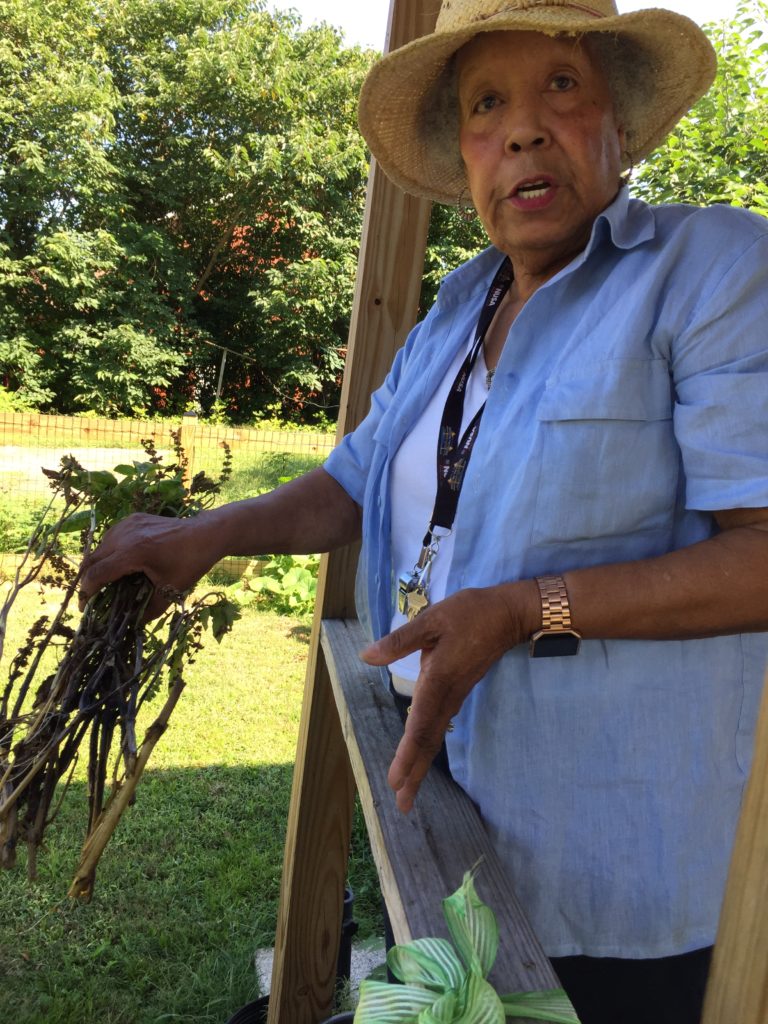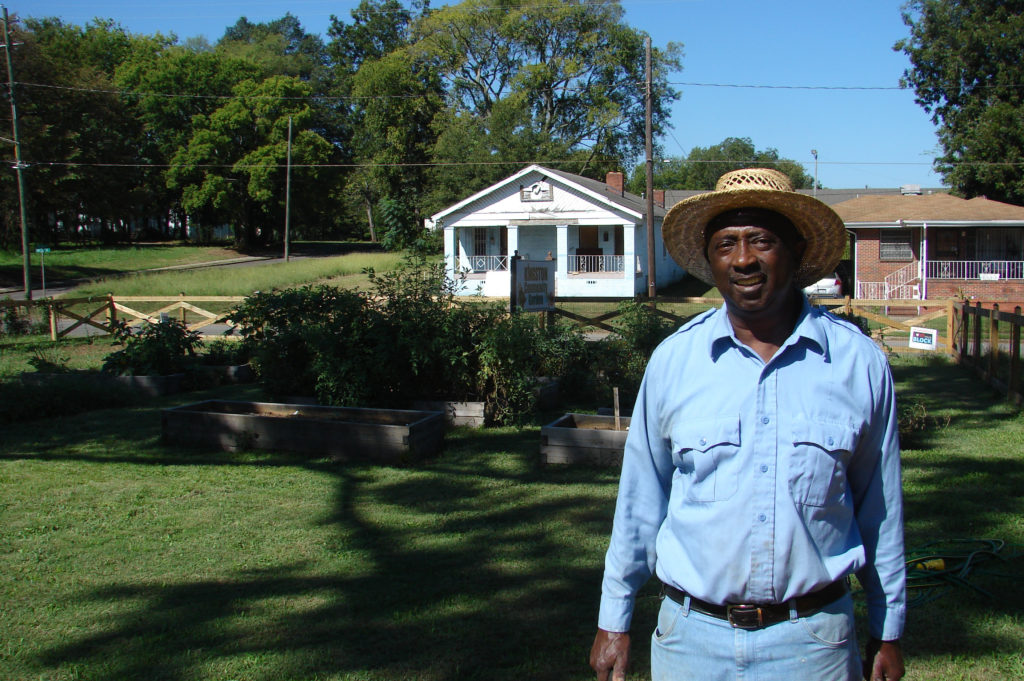
By Nick Patterson
The Birmingham Times

When you see Lillie Cole walking around the Kingston Community Garden, tending to the pumpkin patch or checking under the soil for sweet potatoes, for instance, you might not know how important what she’s doing is connected to the health and well-being of the community.
The health benefits of gardening are many and well-documented. And Cole, president of the Kingston Neighborhood Association, would be the first to say how tending to the community garden has benefited her.
“I’m a country girl, and I really enjoy it,” said Cole, a native of Greensboro, Ala., where her family has 126 acres. Her hometown, located in Hale County, is in Alabama’s Black Belt, named for the dark fertile soil that made the character of the community distinctly agricultural.
“Most of the younger people haven’t been exposed to healthy eating,” she said. “They were brought up with fast food [in the] microwave age.”

Getting involved in the garden “would teach them what healthy living is all about … and different foods and vegetables they are not exposed to,” Cole said.
“Our younger generation, … there’s a lot they don’t know. One young man came by, and he thought the cherry tomatoes were plums. I thought [the garden] was going to be more for education and training, for teaching. If you plant, you [have the choice to] can [the food] or do whatever you want with your proceeds.”
The Kingston Community Garden is more than just a path to healthier, fresher food or even the benefits of exercise and fresh air. It’s a connection to efforts to bring a divided community together, a key part of an ongoing effort to reduce racially oriented health disparities.
The garden and several other initiatives designed to improve life for people in Kingston—a traditionally low-income, mostly African-American community just east of Birmingham’s downtown—are being supported by the Kingston Coalition and efforts by the University of Alabama at Birmingham (UAB) Minority Health and Health Disparities Research Center to improve health issues typical in such neighborhoods.
Healthier Communities
Kingston came to the attention of Mona Fouad, MD, director of the UAB Minority Health and Health Disparities Research Center, after the center was told by its community advisory committee, “If you drive five to seven miles around UAB, there are a lot of deprived communities that are even worse than [some] rural communities.”
“They’re right,” Fouad said.
After working in North Birmingham and Bessemer, the center turned its attention to Kingston through an initiative called Building Healthy Communities.
“We go to a community … and bring in the stakeholders,” Fouad said. “We form a coalition and then we ask, ‘What are your priorities? What are your needs?’ Then we just act as facilitators, and we try to bring the resources to really address what they feel is important to them.”
Kingston turned out to be different than other Birmingham communities, Fouad said.
“To tell you the truth, we got to Kingston and [a variety of] people represented the residents: the neighborhood president, [and another group speaking on behalf of the] housing project. It was overwhelming. Really overwhelming. One person said, ‘All we have here is drugs and guns and domestic abuse. That’s all we see.’”
In Kingston, there are limited options for healthy food and other opportunities for residents, which include a significant number of young single mothers and young unemployed or underemployed men. Three elementary schools that once served the neighborhood—Gibson, Dupuy, and Kingston—all have closed, leaving Hayes K-8 as the only school in the neighborhood.
“This is just a few minutes driving from where we work,” Fouad said. “I’ve been in Birmingham a long time, … and I’ve never seen a deprived community like this one. I was shocked.”
Kingston—just a short distance from Avondale, one of Birmingham’s more popular neighborhoods—couldn’t be more different than nearby communities, and its challenges seemed at first to be too much, Fouad said. She felt there was only so much her team could do to help, but she concluded that working together with folks who live in Kingston and others who have an interest in the area could make positive steps toward improving the lives of residents.
But first they had to overcome a historical problem in the community.
The Divide
“We’re a community that sits inside a neighborhood,” said Eldridge Knighton, resident council president for the Birmingham Housing Authority’s Morton Simpson Homes. “For years, Kingston has always been divided because when you say Kingston, folks say, ‘Oh, Kingston projects.’ … But Kingston actually starts at 41st [Street North] and its goes all the way to 50th [Street North]. Across 10th [Avenue North], there is predominantly housing. … Some houses along this area surround the housing authority community. When I became president, along with Mrs. Cole, the coalition came in to try to get us to be one Kingston.”
That divide was a big issue, Fouad said, because it meant that homeowners and housing community residents were not viewing themselves as a single body, and were ill-equipped to work on issues that affect them all—like the health of the community.
“They didn’t talk to each other, so we tried to bring them together,” Fouad said. “… It took us about maybe six months just to get there.”

The Kingston Coalition—which now has regular participation from both the Kingston Neighborhood Association and Morton Simpson Homes, mainly through the efforts of Cole and Knighton—has sponsored or supported several events, including “Get to Know Your Neighbor,” an event last fall that drew residents from both the housing community and those who live in their own homes.
“That turned out to be a wonderful success,” Knighton said. “We had a nice turnout, but it could have been better.”
The coalition also lends support to events like Morton Simpson’s fall festival and Christmas get-together, as well as Knighton’s movie night for kids at the community center.
‘Pray, Plant, Pick’
For another coalition event—“Pray, Plant, Pick,” held on Aug. 19—all the neighborhood’s residents were invited to visit and sign up to work in the garden. That gathering drew more guests connected with the coalition than Kingston residents, Cole said.
The garden, overseen by Cole and retired school teacher Lovie Crawford, is designed to bring people together.

“Actually, the community garden for me is important, but what’s more important is to put in place a project that gets people to work together and see results,” Fouad said. “It’s not going to feed the community, but its bringing the community together, which makes a big difference.”
Cole knows every nook in the 140-square-foot garden space. She can tell you what is planted in every raised bed. She can spot the sole remaining watermelon of the summer crop peeking out from beneath bushes growing near the neat garden shed.
Cole prayed for the garden, and she has big plans for it. She can tell you where the row gardens will be laid. She knows where the flower bed will be planted to bring butterflies and bees to better pollinate next year’s crops. She has her sights set on the adjacent vacant lot as expansion space. She’s planning a sidewalk library for Kingston’s kids just outside the garden fence.
And while, right now, Cole would like to see a lot more participation in the garden—by people of all ages, housing community residents, homeowners—she’s hardly giving up. The potential for teaching and benefiting the neighborhood are too critical.
“I’m going to keep it up with the Lord’s help, if nobody’s here but Lillie Cole,” she said. “… I asked the Lord for this, and as long as I have health and strength I’m going to be out here.”




